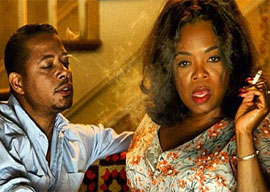
August 22, 2013

Terrence Howard and Oprah Winfrey
Speaking to Parade magazine about the movie, Ms. Winfrey opined that young people “don’t know diddly-squat about the civil rights movement.” Speaking as the parent of two young Americans who, in their passage through public high schools, experienced twelve Black History Months apiece, I’ll see Ms. Winfrey’s diddly-squat and raise her a fiddle-de-dee.
The only non-civil-rights issue that passes before our eyes is the Vietnam War, in which Gaines loses a son. I braced myself for the old quip about Vietnam being the war in which black men were sent to kill yellow men on behalf of the country that white men stole from red men, but the producers unaccountably omitted it. (In fact: “Overall, blacks suffered 12.5% of the deaths in Vietnam when the percentage of blacks of military age was 13.5% of the population.”)
Eisenhower, who did after all send those troops to Little Rock, is given a fair shake, and JFK is of course cool and sympathetic, but the other presidents are cartoon characters from the Cultural Marxist comic book: Nixon a creepy drunk, LBJ a crude boor (well…), Ford a cipher. It seems for a while, incredibly, that Reagan might get fair coverage, but then he vows to veto sanctions against South Africa. See?”just another white devil determined to keep the black man down.
The movie’s non-presidential whites are snarling, spitting bullies, except for a handful of non-talking parts: Pablo Casals, for example, is praised for his hostility to General Franco. That would be the General Franco who saved Spain from becoming Stalin’s first European satellite.
The Butler is romantic in the precise sense given by Webster’s Third: “marked by the imaginative or emotional appeal of the heroic, adventurous, remote, mysterious, or idealized characteristics of things, places, people.”
Watching it and reading what Ms. Winfrey has said about it, you realize how deeply and narcissistically absorbed American blacks are in this romance”the romance of American blackness. Nothing else really exists for them. Ms. Winfrey has endorsed three politicians, to my knowledge: Barack Obama, Michael Tubbs, and Cory Booker. Notice anything?
If there are few likeable whites in The Butler, there are no unlikeable blacks at all. Everyone is well-spoken and well-behaved except when righteously angry. All are struggling to keep their honor and self-respect in a society whose every hand is against them. The proverbial visitor from Mars, given only this movie to work from, would be baffled why prejudice against blacks exists.
Where, you find yourself wondering, are the other blacks: the feral, criminal, ebonics-jabbering lumpen-negrotariat of the slums? Where are their innumerable white victims? Wasn’t there any room for these souls in Oprah Winfrey’s movie? Not romantic enough, perhaps.